Formulas for premature and low birth weight babies are placed in a separate group, since the need for nutrients and energy in such newborns is different compared to normal ones. Premature babies are understood to be children born at 28-37 completed weeks of pregnancy, weighing 1000-2500 g, and whose height is 34-45 cm. Depending on the weight of the child, there are four degrees of prematurity, each of which is characterized by its own methods and feeding habits. Low birth weight babies are understood to be children born at term, but with a body weight of less than 2500 g. Breast milk will be the undisputed leader in health and nutritional value for such babies. If breastfeeding is not possible, special formulas are used.
Features of the composition
Nutrition for premature babies is usually labeled with the prefix “PRE”. The exception is HiPP PRE, which is recommended for feeding ordinary children from birth. Abbott produces Similac Neoshur and Similac Special Care.
Nutrition for premature babies is characterized by an increased calorie content compared to the standard one. The daily protein requirement is also higher. It has been established that the higher the degree of prematurity of the baby, the more protein his body needs. Using regular adapted ones instead of specialized mixtures can lead to a slower increase in muscle mass, while the proportion of adipose tissue will increase. The result is a lag in the rate and speed of growth.
International recommendations for protein consumption by such children during the day are 3-4 g/kg body weight. Larger amounts of protein lead to metabolic disorders. The composition of the protein component of the mixture is of no small importance - it should be predominantly whey proteins, since casein is poorly absorbed by premature babies, which leads to an imbalance of amino acids. In the dry mixtures PreNAN, Humana 0 HA, as well as in the liquid ready-made mixture PreNAN 0, partially hydrolyzed protein is used instead of regular protein, which increases its digestibility and reduces allergenicity.
Important! The high protein content in the diet for premature babies allows for high growth rates and rates.
The optimal amount of fat is 6-6.5 g/kg body weight per day.
The fat component contains medium-chain triglycerides, which can be absorbed by the body without the influence of the digestive enzyme lipase, the activity of which may be reduced due to the prematurity of the baby. Also required for administration are arachidonic and docosahexaenoic fatty acids. The reduced activity of the lactase enzyme, which breaks down lactose (only 30% of its activity in a newborn born at term), forces the replacement of part of the lactose (15-30%) with dextrine maltose. In general, the recommended amount of carbohydrates for newborns born prematurely is 10-14 g/kg per day.
A feature of the mineral composition of such mixtures is the increased content of iron and copper, which reduces the risk of iron deficiency anemia, since their body has not yet had time to make a sufficient supply of these elements. The vitamin content is also increased compared to conventional adapted mixtures.
Read about calculating the amount of nutrition for premature babies depending on age using a calorie method in this article.
In addition to regular baby food for premature and low birth weight babies, Nestlé produces breast milk fortifier PreNAN FM85. It allows you to increase its nutritional and energy value. PreNAN FM85 can be used according to a standard dilution scheme or an individual one, if a preliminary analysis of the composition of breast milk has been done, which made it possible to determine the dilution rate for a particular baby.
Rules for cooking and feeding premature babies
For rapid weight gain by a premature baby and subsequent normal development, it is not enough to choose the right diet. It needs to be used wisely.
Pediatricians recommend:
- The dry mixture should be prepared strictly according to the instructions and immediately before use. Liquid - heat in a water bath or in a special heating pad.
- To dilute the dry mixture, you need to use boiled or specialized baby water.
- It is forbidden to give a premature baby formula for normal children. Such a product can have a negative effect on the body (poisoning, allergies, digestive upset). Formulas for artificial feeding sometimes contain soy protein. It is not absorbed by the body of a premature baby.
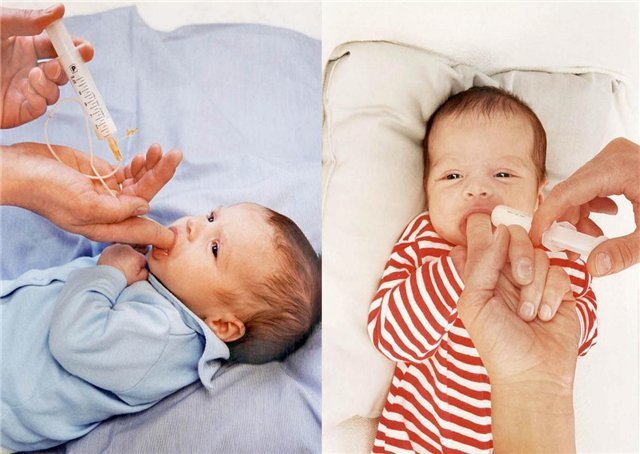
Dishes must be washed and sterilized. When using syringes, it is recommended to give preference to disposable ones.
How to feed a baby
Often nutrition is prescribed to the baby from birth. He receives his first portion of artificial nutrition in the maternity hospital. After discharge, the same brand should be used. Sometimes a weakened baby is fed through a tube immediately after birth. At home, you should use a disposable syringe. After the sucking reflex is restored, it is recommended to use a bottle.
For the first time, you should give your child no more than 10 ml of the product. Then you need to look at the baby’s reaction. If there are negative effects, you should notify your pediatrician.
It is not recommended to give additional alcohol to newborn children. Formulas for low birth weight and premature babies provide them with enough fluid. Excess water will overload the kidneys. After reaching the required weight, the baby should be switched to food for ordinary children. These products are marked “1”. They are fed for up to 6 months.
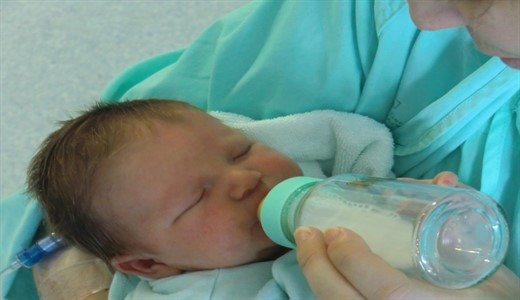
Complementary feeding begins at 5 months. First they give you dairy-free porridge.
How long should you feed your baby with formula for premature babies?
Special nutrition is required for babies until they reach a weight of 3-3.5 kg. The transition to formula for ordinary children is carried out gradually. The transition period is a month. It is important to control the total amount of protein in a comprehensive diet. Excess will overload the baby's body.
In some cases (severe prematurity, low weight gain), the pediatrician decides to continue feeding with special formulas until 6-9 months. Number of appointments: 1-2 per day.
How long can you feed formula for premature babies?
The duration of use of nutrition for premature babies is determined by the amount of protein in artificial nutrition. In the event that the amount of protein does not exceed 2.2 g/100 ml of product, it can be used up to a body weight of 2500 g as the only mixture. The calorie content of the diet should not exceed 130 kcal/kg. After reaching the specified weight, they begin to gradually give the usual one, but not completely displacing the specialized one, but maintaining it in the amount of 30% of the total amount of food for several more weeks or months. This feature leads to the need to control the diet of an infant not only in terms of calories, but also in protein, so as not to overload the body. The duration of such a combined diet is determined by the degree of prematurity. Thus, in the nutrition of very premature infants, the use of a specialized formula can be maintained up to 6-9 months of age in the amount of 1-2 feedings per day.
If the protein content is more than 2.2 g/100 ml of product, a specialized mixture is used until the weight reaches 1800 g. Next, the usual adapted one is introduced with complete replacement of the specialized one, since their simultaneous use leads to exceeding the amount of protein maximum permissible during the day.
The use of specialized formulas for premature infants up to 6 months in a small volume (1/3-1/4 daily volume) is especially important for very premature infants, as it allows them to provide them with all nutrients, accelerate growth and prevent the development of osteopenia (decreased bone density ).
Features of nutrition of premature babies
The best food for babies born prematurely is breast milk. It strengthens the immune system and promotes the proper colonization of bacteria in the gastrointestinal tract.
But there are times when it is impossible to get enough milk:
- mother has no lactation;
- the sucking reflex is weak (the baby falls asleep during feeding);
- the mother’s nipples are too rough or depressed (the child cannot hold them in his mouth).
In these cases, a composition is prescribed for premature babies. This is a therapeutic food. It is sold in pharmacies. You cannot prescribe formula to your baby on your own: the pediatrician takes into account the child’s developmental characteristics. The intervals between feeding babies are 3-3.5 hours. During this time, the food will be completely digested and the baby will become hungry.

The goal of therapeutic nutrition for babies born prematurely is to quickly gain muscle mass. A child who has grown to 3000 g is transferred to formulations for full-term children. The transition is being carried out gradually. The scheme is determined by the doctor.
Sometimes the pediatrician leaves 1-2 feedings per day with a medicinal mixture. This is due to the characteristics of the individual patient.
List of formulas for premature babies weighing up to 1800 g
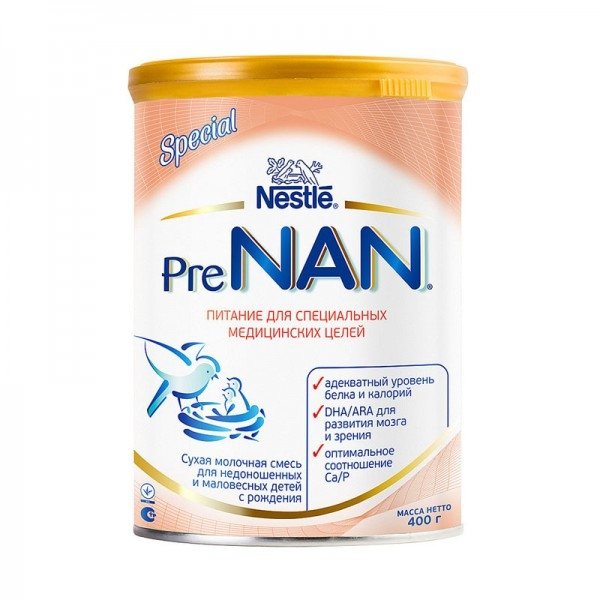
PreNAN
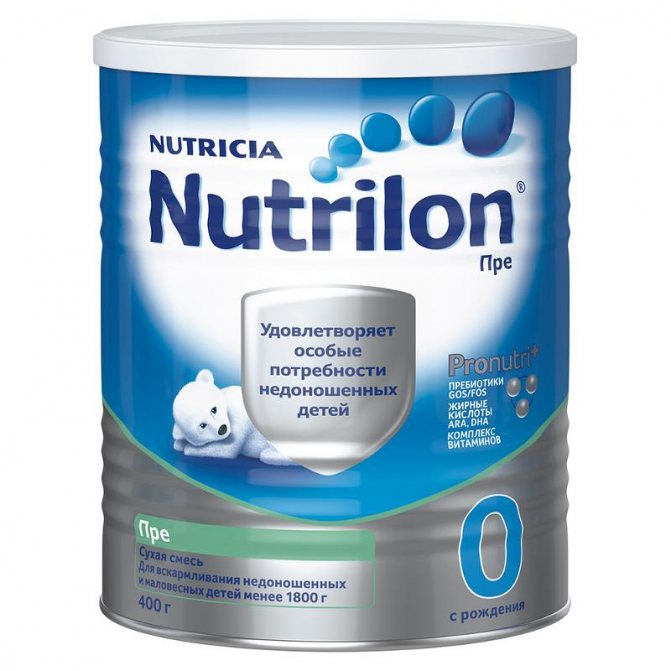
Nutrilon Pre
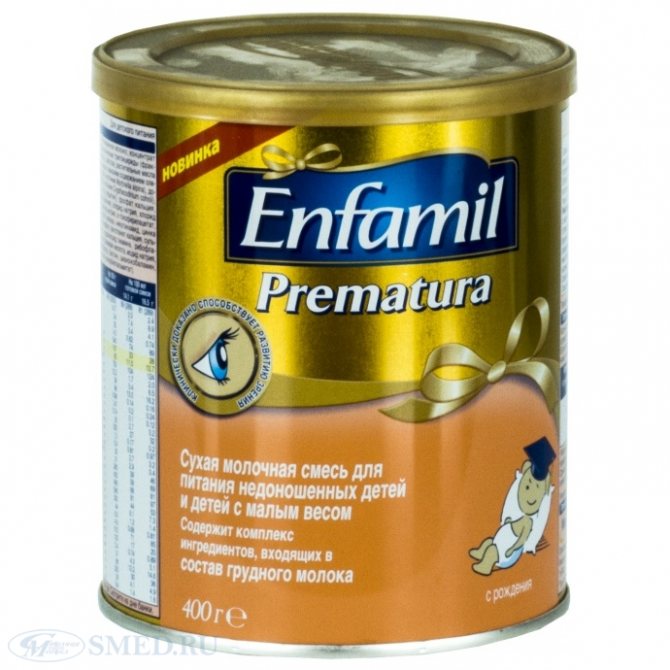
Enfamil Prematura
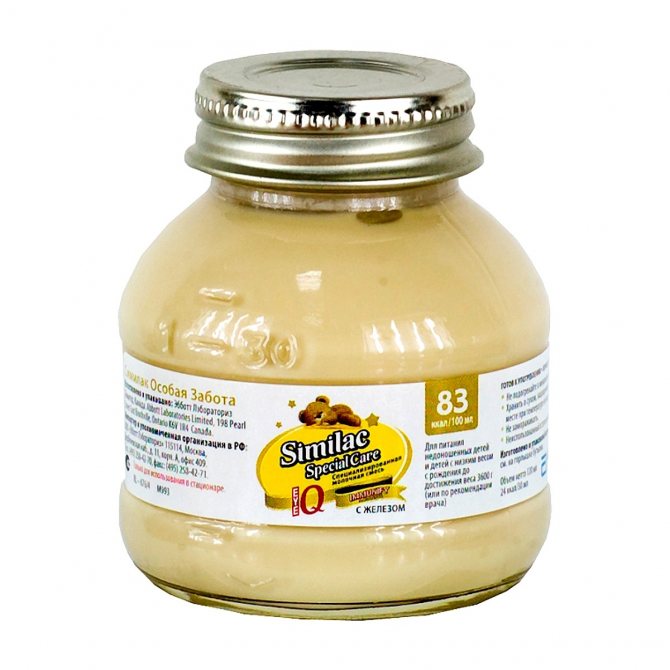
Similac Special Care
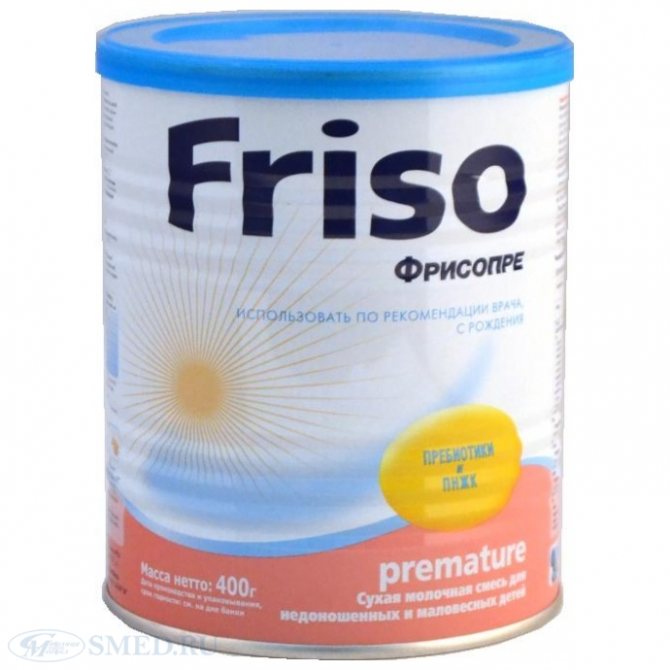
Frisopre Bellakt Pre PreNAN 0 PreNAN FM85
Which formula is best for premature babies?
According to the degree of readiness for consumption, food for premature babies is divided into dry and liquid. It is believed that liquid mixtures are the safest, since they are sterile and minimize the risk of bacterial microflora entering from the outside during the operations for their preparation. Thus, from a microbiological safety point of view, it is better to use liquid mixtures. Otherwise, the selection of the product is individual in nature and is mainly determined by the degree of prematurity.
Infant formula for premature, low birth weight babies: composition features
Formulas for premature and low birth weight babies are radically different in composition from other infant formulas. This striking difference is due to the fact that babies born prematurely need more calories and microelements than children born at term.
Formulas for premature babies contain:
- Large amount of protein . This “building” material will help the baby get stronger and develop muscle and fat mass.
- Casein is a whey protein that is easily and quickly absorbed by small bodies.
- Maltodextrin and lactose . These are easily digestible carbohydrates that give energy and develop brain activity.
- Vitamins and microelements . The mixture should contain vitamins B, A, E, K, as well as iron, copper, iodine, and manganese. The content of phosphorus and calcium is necessary to strengthen the baby’s bone tissue.
- Probiotics are beneficial bacteria, thanks to which the gastrointestinal tract functions without interruption and the intestinal microflora is “ennobled”.
- Polyunsaturated acids , which are very important for the formation of immunity and vision.
Also, a specialized milk formula has an increased energy value for rapid weight gain.











